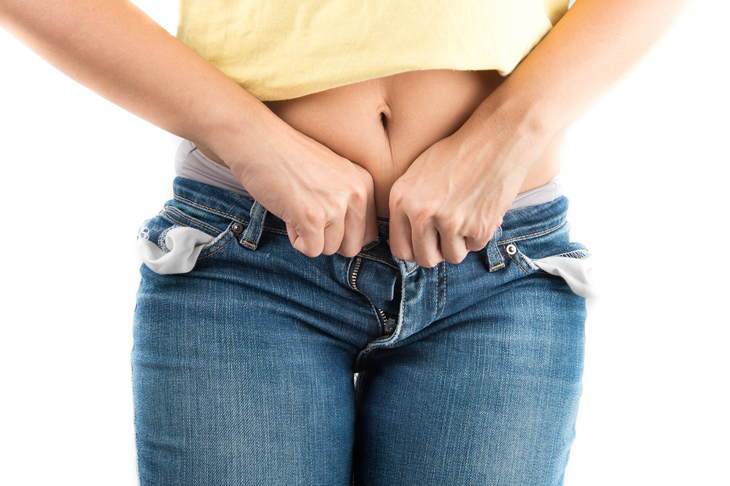Why do we do it? We really need to stop supporting the snake-oil industry. We know there is no such thing as a miracle diet, a magical health cure, a mystical practice or a strange (and always expensive) product that is going to make us youthful, happy and, above all, thin.
When Planet Organic first opened in Westbourne Grove, it was a great shop, with a butcher, fishmonger and baker as well as a good range of veg and groceries. Now a third of the shop is shelf upon shelf of supplements, beauty preparations and diet books; another third is a café; and what meat and fish there is comes in vacuum packages.
You can’t blame the owners. We are addicted to coffee and a cup of it nets the shop about £2 in profit. And they wouldn’t sell all those unnecessary supplements if we didn’t buy them. The profit on a £100 bottle of seaweed detoxifying purge is a lot more than on a £100 basket of real food.
We all know that the way to lose weight is to eat less. If it doesn’t go in, it can’t go on, as my husband John says to me when I reach for a biscuit. Keep under 2,000 calories a day if you’re a woman, 3,000 if you’re a man, and you won’t gain weight. Keep under 1,500 and you will slowly lose it.
All weight-loss diets, however dressed up, boil down to eating less. The Blood Sugar diet, Dopamine diet, Paleo diet, Juice diet, Gut diet, Body and Soul diet, 5:2 diet, Lean in 15 diet, Raw Food diet, Cambridge diet, the New Atkins diet — all restrict one food group or another and so limit calories. The truth is any diet will work if you stick to it, but our only hope of staying slim is by training our bodies to be happy with fewer calories, every day, for ever. Boring but true.
If you want to be healthy as well as thin, you need a balanced diet — which means a lot of fresh veg and fruit, some carbs (preferably unrefined), not much protein and very little fat. And you have to stay off sweet and salty junk and cheap processed food. This is all common sense of course. If you spend your 2,000 calories on chips and ice cream, they’ll be gone by lunchtime and you’ll be hungry again. Just a single maxi milkshake can be 1,000 calories.
And then there are the dietary fads that unfortunately come and happily go. Only 1 per cent of us, at most, are gluten intolerant, and yet you seldom sit down to a meal with six people without one at least demanding gluten-free food. Or grain-free. Or sugar-free. Or dairy-free. Or fat-free. Or something-free.
It’s largely about fashion, I think. Even foodstuffs have to be fashionable. At the moment the hot picks are avocado pear, pomegranates, blueberries, yuzu fruit, acai, goji berries, chia seeds, green tea, kale, ginger, turmeric, apple cider vinegar, dark chocolate, coconut oil, miso and kimchi. Extravagant health-giving claims are made for all of them. My advice is to eat them if you like them and forget them if you don’t. And don’t reach for supplements. There are quite enough nutrients in ordinary fresh food to keep you healthy without spending a fortune on weird ingredients or pills. The US public spends $500 million a year on antioxidant supplements alone. Supplements are very big business.
I think we should just eat good fresh food and ignore the diet gurus, the health bloggers, the pill-pushers and the scaremongers. They haven’t a clue what’s true and what isn’t, and neither do we. But they do talk an awful lot of bosh. ‘Wellness expert’ Jasmine Hemsley uses a tongue scraper because, she says, ‘all your toxins come out on your tongue’. David ‘Avocado’ Wolfe claims coconut oil ‘rids the body of lice and parasites such as tapeworms, kills infection in the gut, destroys viruses that cause influenza, herpes, measles, hepatitis and more’.
In my career, I’ve seen eggs, butter, cream, meat, salmon, orange juice, chocolate, bananas, and I’m sure a whole lot more that I can’t remember, vilified as actually bad for you, and then resurrected as health-giving natural foods.
Then there’s all this nonsense about having to have a ‘clean gut’. Which often means buying some expensive products to give you the runs, and others to ‘detox’ (meaningless word) your digestive tract. Unless you’re ill — in which case you need a doctor, not some self-styled ‘nutritionist’ — your body has a perfectly good system of elimination called (I’m sorry about this) defecation. And healthy fresh food is all your gut needs to make it happen.
By the way, don’t be fooled by medi-talk on the net. Anyone can call themselves a nutritionist. To be a dietitian, you need to have a recognised qualification.
And just to complete the health info that you don’t need because you’ve known it for ever, you need to exercise too — and to limit the booze intake.
But if you really want to understand how much bad science and money-driven marketing surrounds ‘healthy eating’, you have to read The Angry Chef by Anthony Warner (Oneworld, £12.99). And if you want to check some too-good-to-be-true health ‘fact’, use the Sense About Science website.
Oh, and the occasional blow-out won’t kill you. Spread the word.
Got something to add? Join the discussion and comment below.
Get 10 issues for just $10
Subscribe to The Spectator Australia today for the next 10 magazine issues, plus full online access, for just $10.
You might disagree with half of it, but you’ll enjoy reading all of it. Try your first month for free, then just $2 a week for the remainder of your first year.














Comments
Don't miss out
Join the conversation with other Spectator Australia readers. Subscribe to leave a comment.
SUBSCRIBEAlready a subscriber? Log in